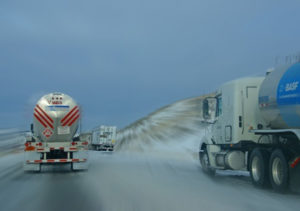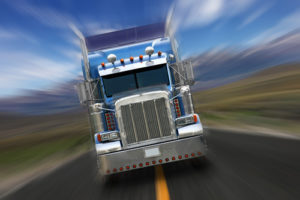
These are some of the common (and less common) causes of truck accidents. To learn more about a specific cause, click on its heading to see more information.
It is a basic driving rule to keep enough space between your vehicle and the one in front of you so that you can stop without hitting or rear-ending that other vehicle. For semi-trailers and other large trucks, this rule is even more crucial, given the heavy and sometimes hazardous nature of their cargo. Unfortunately, our experience as a truck accident law firm has shown 18-wheelers and other large trucks repeatedly follow too closely and rear-end other vehicles.
This is one of the major causes of truck wrecks. Drivers of large trucks such as tankers, moving vans, and other 18-wheelers typically need a system of well-placed mirrors to see what’s beside and behind the truck. Still, there are significant blind spots – areas that a truck driver cannot see. If a truck driver starts switching lanes, not seeing there is another vehicle in a blind spot, an accident such as a sideswipe collision may occur.
Truck drivers are known to experience fatigue and drowsiness. A fatigued or drowsy driver may have slower reaction time when driving, lose focus on the road, or worse, fall asleep at the wheel. Federal Motor Carrier Safety Regulations are trying to mitigate these risky scenarios by limiting the number of hours that truckers can be on duty. However, driver fatigue continues to cause many truck accidents.
It is extremely important for a truck to have properly working parts such as brakes, tires, and lights. Imagine an 80,000-pound semi-truck that suffers a brake failure or tire blowout on a highway – the results can be catastrophic and deadly. Fortunately, equipment failure is not one of the most common causes of truck crashes, thanks in large part to federal regulations, motor carrier inspectors, law enforcement, and inspections by the truckers themselves.
 Improper Loading Or Securing Of Cargo
Improper Loading Or Securing Of Cargo
Truck cargo is usually heavy enough to affect the balance of the vehicle. If the cargo is improperly loaded, is unevenly distributed, lacks securement, or surpasses the truck’s maximum capacity, it can shift the truck’s balance and cause the vehicle to tip or roll over. An accident like this can crush occupants of other vehicles in the way. The load may also fall off the truck and seriously injure people on the road.
 Distracted Driving/Inattentive Driving
Distracted Driving/Inattentive Driving
Research has shown that distracted or inattentive driving is one of the top causes of accidents involving trucks. Truck drivers who do not pay proper attention to road and traffic conditions are a major contributing factors of crashes. A common example of distracted driving is using cellphones while behind the wheel.
All drivers are expected to be familiar with road rules concerning right-of-way: what to do at stop signs, left turns, traffic signals, merges, and similar situations. Professional truck drivers should especially know these, but failure to yield the right-of-way continues to be a significant contributing factor in wrecks involving big trucks.
 Speeding/Driving Too Fast For Conditions
Speeding/Driving Too Fast For Conditions
A truck needs some time and distance to be able to stop safely. The faster it travels, the more time and stopping distance it needs. If a large vehicle is traveling at high speed, or traveling too fast for existing road conditions, it would not be able to stop quickly, thus increasing the potential for a collision.
Rain, ice, snow, and sleet are bad enough for regular vehicles, but for a tractor-trailer or other large truck, bad weather conditions are even more difficult because of the truck’s weight, cargo, and design. Federal regulations on motor carriers require truckers to be extremely cautious and to reduce speed in these conditions, and to completely refrain from driving if conditions are dangerous enough. Still, many truck wrecks occur on slick roads and similar dangerous conditions.














